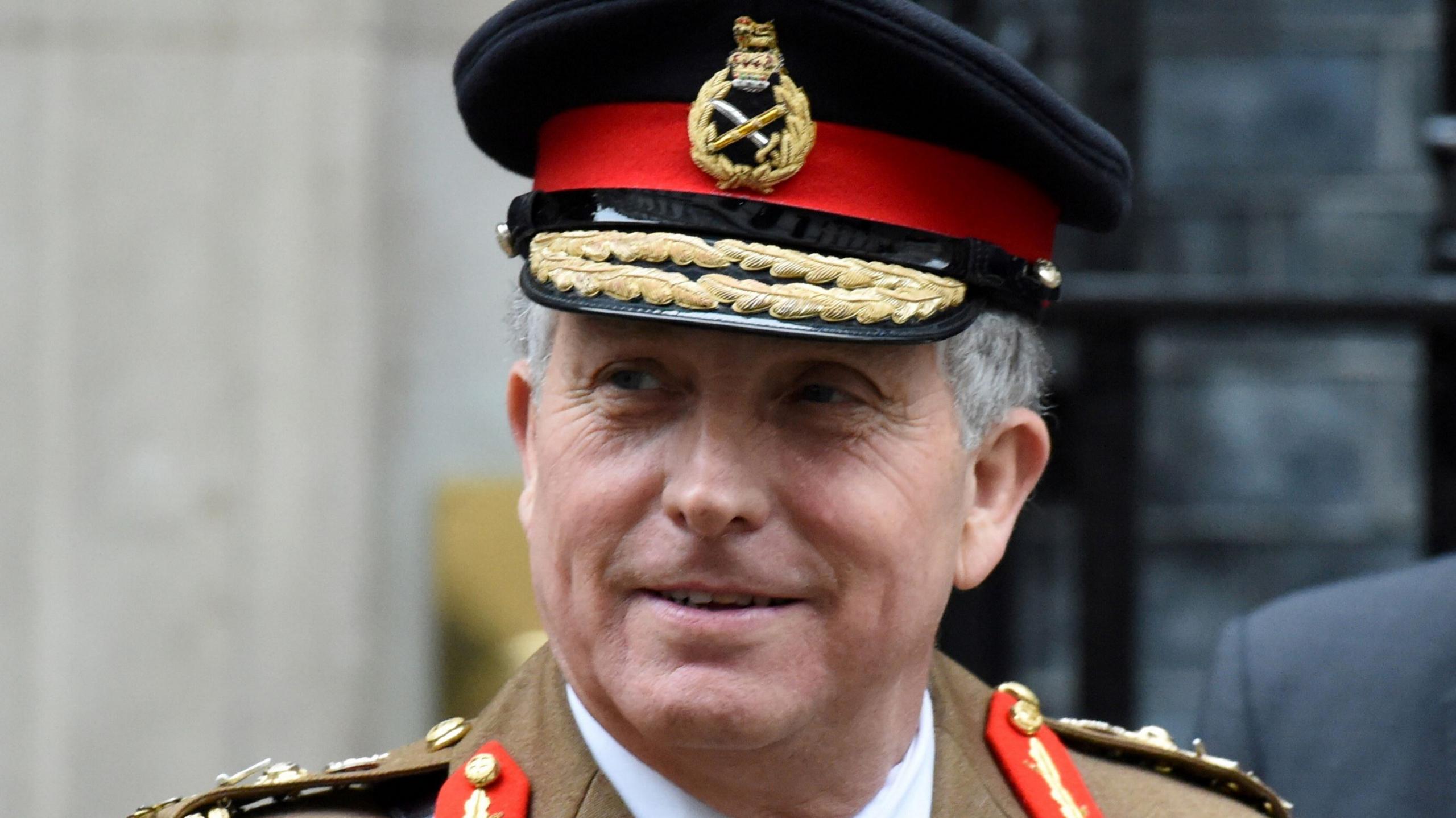Europe must secure Ukraine's future if US won't, ex-Army head says

Sir Nick Carter says the UK and European countries need to "step up" over Ukraine
- Published
European nations may need to offer reliable security guarantees to Ukraine in the event of a peace deal with Russia if the US will not, the former head of the UK armed forces has said.
Retired General Sir Nick Carter said ensuring Ukraine's sovereignty was fundamental to a fair deal, and that Europe must set out its vision of peace that deters Russian aggression.
He said the UK could take a lead in doing this, ahead of Prime Minister Sir Keir Starmer's meeting with US President Donald Trump next week.
US efforts to bring the war in Ukraine to an end have recently caused a growing rift between Trump and Ukrainian President Volodymyr Zelensky, and sparked discussions among European leaders.
The US has announced it will soon begin direct negotiations with Russia on a peace deal as the Trump administration seeks to take a smaller role in securing Europe.
However some of Trump's recent remarks about Ukraine and its leader have caused concern about the direction those talks may go. On Thursday night, Zelensky said Ukraine needed "reliable and well-defined" security guarantees.
Gen Carter, who was chief of the UK's defence staff between 2018 and 2021, said it was for Ukraine to decide what a "fair settlement" to end the war meant.
But the UK and other European allies needed to make clear their position on "what the minimum acceptable level might be", he told a BBC One Question Time special on the war in Ukraine.
"Fundamentally, there has got to be some form of guarantee of Ukraine's sovereignty in the future.
"That means there's got to be a copper bottom security guarantee, and if America's not prepared to do that then some others are going to have to step up to the plate to provide that.
"You can add to it accession to the European Union, you can add a viable economy - there are other ingredients that would look like a just and viable peace. But the bottom line is a security guarantee."
Sir Keir has previously said a "US security guarantee" is "the only way to effectively deter Russia".
But he also said the UK would be willing to provide peacekeeping troops if a US "backstop" was provided. Allies have suggested this could involve US air support, logistics and intelligence capabilities.
Trump said earlier this week, external that he "would not object" to Europe sending in peacekeeping troops, but the US "won't have to put any over there".
British Army 'absolutely ready' if ordered to deploy to Ukraine
- Published18 February
The worrying pitfalls ahead of Starmer's US trip
- Published20 February
Washington has suggested more generally that Europe needs to take greater responsibility for its own defence.
Gen Carter warned the UK armed forces were "remarkably hollow" after a "process of neglect over a 30-year period".
"We are in a position, I think, where we are massively vulnerable at the moment," he said, describing how much of the UK's critical infrastructure was dependent on undersea cables or "not properly protected by cyber defences".
He continued: "Whether we like it or not, that means we're going to have to start protecting ourselves.
"And the sort of onslaught that Ukraine has suffered from the air via drones and missiles over the course of the last three years is unsustainable as far as the UK's concerned.
"We might be able to park a destroyer in the Thames to protect parts of London but nothing more than that."
Watch: "I wish I would see my family all together" - Ukrainian
In the US, the prime minister is expected to maintain his support for Zelensky and Ukraine while seeking to gain Trump's ear over talks with Russia.
He will visit the White House after French President Emmanuel Macron, who is seeking to co-ordinate a European response.
China, a vital partner for Russia, has offered its support for the US-Russia talks, with Foreign Minister Wang Yi saying "a window for peace is opening".
But Foreign Secretary David Lammy appeared sceptical of whether Moscow was serious about peace, after listening to his Russian counterpart Sergei Lavrov's speech at a G20 summit in South Africa.
He said the UK was "ready to listen" to Russia if it was serious about peace and rejected "Tsarist imperialism".
During Thursday's programme, Ukrainian refugees in the audience spoke about the trauma of seeing their country torn apart by war.
One woman began crying as she said she wanted to return home to her parents, adding: "I wish I would see my family all together."
Millions of Ukrainians have fled their homeland since Russia's full-scale invasion began nearly three years ago.
Accurate casualty counts are hard to come by, but it is estimated that hundreds of thousands of people, most of them soldiers, have been killed or injured in the conflict which continues to rage while talks begin.
At least six people were killed in Russian strikes on three separate regions on Thursday, according to local authorities.
Meanwhile, on the frontlines, Russia has been gaining ground faster than at any time since the start of the war.
BBC Question Time
Fiona Bruce presents a special debate from London on the war in Ukraine
Fact-checking Trump claims about war in Ukraine
- Published19 February
Ukraine must strike minerals deal, says Trump adviser
- Published20 February
Ukrainian leader not a dictator, says Farage
- Published20 February

Sign up for our Politics Essential newsletter to read top political analysis, gain insight from across the UK and stay up to speed with the big moments. It'll be delivered straight to your inbox every weekday.